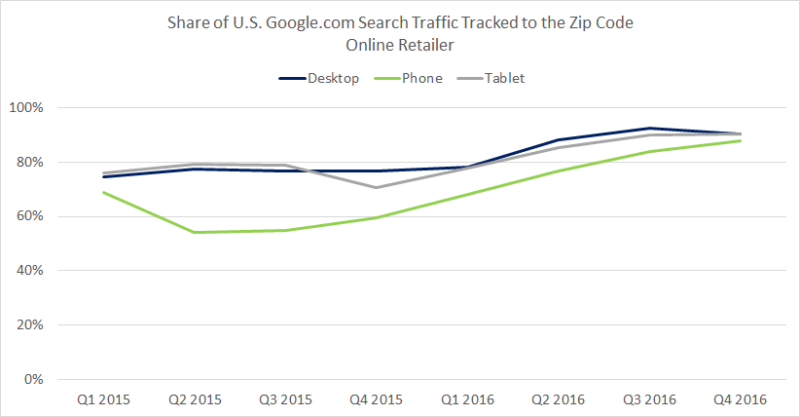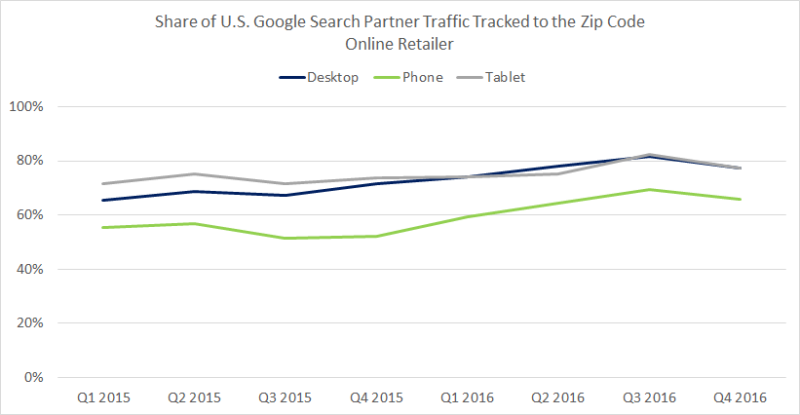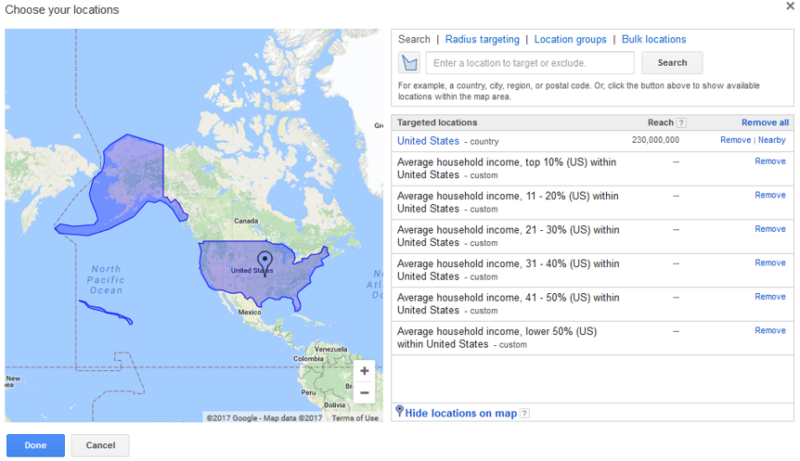Google’s location tracking is better now than ever before
Columnist Andy Taylor notes that Google has improved its ability to track search traffic at the ZIP code level, which is good news for advertisers who employ granular geographic targeting.

In April 2015, I wrote about Google’s progress in steadily tracking more and more user locations to ZIP codes. As ZIP codes are the most granular location type which populates the “Most specific location” field in AdWords geographic reports, the share of traffic that Google assigns to ZIP codes in this field gives advertisers an idea of how well Google is doing at figuring out searcher locations.
At the time, Google was showing strong progress in its location tracking:
Fast forward to today, and Google is tracking more searchers to ZIP codes than ever before. However, most of the progress made only applies to google.com traffic, while search partners are continuing to lag in terms of the share of searchers tracked to a ZIP code.
One big, huge, ginormous caveat
The most important thing to keep in mind with this analysis is that it is based on the locations that Google itself reports. This means that if Google were to, say, expand the use of modeling to infer searcher location to apply to users whose locations it is less confident in, we might see a rise in the share of traffic tracked to a ZIP code without any change in what information Google is actually getting.
As such, the trends shown here could be the result of updates Google itself made in assigning and reporting searcher location, rather than Google actually obtaining more granular information on searcher location over time. They could also be the result of a combination of Google changes and more granular information.
Google better able to track google.com searcher locations across all device types
Across the board, Merkle advertisers are finding more and more traffic attributed to ZIP codes in the “Most specific location” field in AdWords geographic reports. Looking at google.com traffic specifically for one advertiser, we find that while 28 percent of all traffic in Q1 2015 could not be tracked to the ZIP code level in this field, that figure was just 11 percent in Q4 2016.
The share of traffic tracked to ZIP code has risen for all device types over the last couple of years:
Google continues to track more searchers to the ZIP code level on desktop and tablet computers than on phones, but the gap is now much smaller than it was two years ago.
Location tracking users on search partners lagging but getting better
Search partner location tracking is also getting better, but no device type topped 80 percent in share tracked to the ZIP code level in Q4 2016. As with google.com searchers, phone searchers are less likely to be tracked to a ZIP code.
As such, it’s apparent that Google isn’t always receiving the same information from search partner sites as it gathers when searchers are on Google’s website. It could be that there are specific sites which have issues, or it could be that this is just a complication Google has with all of its search partners.
Either way, Google’s progress in tracking search partner user locations at the ZIP code level is rather muted when compared to the significant leaps it has made in tracking searcher locations on its own site.
Google average household income targets becoming more powerful
Google average household income (HHI) targeting has existed for several years now, and it allows advertisers to target ads and adjust bids based on the average income of the ZIP code a user is searching from using income percentile bundles. In this way, advertisers can target, for example, all of the US searchers which Google can identify as searching from ZIP codes in the top 10 percent in average household income without having to add all of those ZIP codes individually.
Since these targets are based on ZIP code location, only those searchers tracked to the ZIP code level are targeted with them. The share of US traffic attributed to income brackets is nearly identical to the share of traffic tracked to the ZIP code level in geographic reports.
As such, Google’s progress in location tracking helps these targets account for a greater share of the population.
Better tracking is better for advertisers
ZIP code certainly isn’t the most granular location Google can track users to. Advertisers can target searchers as close as one kilometer from a specific address using AdWords radius targeting, and Google’s in-store visit tracking relies on tracking searchers to within feet of brick-and-mortar locations in order to credit ad campaigns with driving store visits.
However, the share of US traffic that is tracked to ZIP code in the “Most specific location” column gives advertisers an idea of how well Google is able to track users to granular geographic locations. This information helps inform campaign targeting strategy over time.
When Google was still only able to track about 70 percent of search traffic to the ZIP code level, advertisers that used only ZIP code-level geographic targeting were missing out on around 30 percent of traffic from those areas. Now that Google tracks much more traffic to the ZIP code level, that’s less of a concern, and advertisers can feel more comfortable using granular location targeting.
As mentioned, search partner location tracking lags that of google.com, but search partners only accounted for 9 percent of all Merkle advertiser Google search clicks in Q4 2016. Thus, while we’d prefer to see more progress in location tracking on the partner network, these sites don’t account for a hugely significant share of traffic overall that can’t be identified at the ZIP code level.
Whether it’s location or demographic audiences or any other type of search targeting, it’s safe to assume that Google will continue to progress in its ability to track user attributes for better ad targeting. This is a win for advertisers, as campaigns that target specific locations and groups are steadily targeting a greater share of the total population that falls into those locations and groups.
It also increases the likelihood that the most correct bids are placed in the AdWords auction for campaigns which target larger geographic areas (such as the entire United States) but use smaller location targets (such as the ZIP code 22902) to adjust bids for users in specific areas. This will only help advertisers to invest more in paid search by helping marketers to spend each dollar as effectively as possible.
Contributing authors are invited to create content for Search Engine Land and are chosen for their expertise and contribution to the search community. Our contributors work under the oversight of the editorial staff and contributions are checked for quality and relevance to our readers. The opinions they express are their own.
Related stories
New on Search Engine Land



